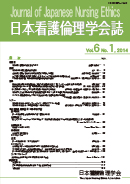Volume 6, Issue 1
Displaying 1-21 of 21 articles from this issue
- |<
- <
- 1
- >
- >|
Editorial
-
2014Volume 6Issue 1 Pages 1-2
Published: March 20, 2014
Released on J-STAGE: May 31, 2019
Download PDF (478K)
Original Articles
-
2014Volume 6Issue 1 Pages 3-11
Published: March 20, 2014
Released on J-STAGE: May 31, 2019
Download PDF (668K) -
2014Volume 6Issue 1 Pages 12-19
Published: March 20, 2014
Released on J-STAGE: May 31, 2019
Download PDF (592K) -
2014Volume 6Issue 1 Pages 20-29
Published: March 20, 2014
Released on J-STAGE: May 31, 2019
Download PDF (689K) -
2014Volume 6Issue 1 Pages 30-38
Published: March 20, 2014
Released on J-STAGE: May 31, 2019
Download PDF (620K)
Notes
-
2014Volume 6Issue 1 Pages 39-45
Published: March 20, 2014
Released on J-STAGE: May 31, 2019
Download PDF (740K) -
2014Volume 6Issue 1 Pages 46-52
Published: March 20, 2014
Released on J-STAGE: May 31, 2019
Download PDF (660K) -
2014Volume 6Issue 1 Pages 53-60
Published: March 20, 2014
Released on J-STAGE: May 31, 2019
Download PDF (662K) -
2014Volume 6Issue 1 Pages 61-67
Published: March 20, 2014
Released on J-STAGE: May 31, 2019
Download PDF (710K) -
2014Volume 6Issue 1 Pages 68-74
Published: March 20, 2014
Released on J-STAGE: May 31, 2019
Download PDF (447K)
Letters
-
2014Volume 6Issue 1 Pages 75-77
Published: March 20, 2014
Released on J-STAGE: May 31, 2019
Download PDF (635K) -
2014Volume 6Issue 1 Pages 78-80
Published: March 20, 2014
Released on J-STAGE: May 31, 2019
Download PDF (478K)
6th Annual Conference of Japan Nursing Ethics Association
President’s address
-
2014Volume 6Issue 1 Pages 81-82
Published: March 20, 2014
Released on J-STAGE: May 31, 2019
Download PDF (234K)
Keynote address 1
-
2014Volume 6Issue 1 Pages 83-91
Published: March 20, 2014
Released on J-STAGE: May 31, 2019
Download PDF (723K)
Keynote address 2
-
2014Volume 6Issue 1 Pages 92-95
Published: March 20, 2014
Released on J-STAGE: May 31, 2019
Download PDF (583K)
Educational lecture
-
2014Volume 6Issue 1 Pages 96-97
Published: March 20, 2014
Released on J-STAGE: May 31, 2019
Download PDF (422K)
Symposium
-
2014Volume 6Issue 1 Pages 98-99
Published: March 20, 2014
Released on J-STAGE: May 31, 2019
Download PDF (337K) -
2014Volume 6Issue 1 Pages 99
Published: March 20, 2014
Released on J-STAGE: May 31, 2019
Download PDF (303K) -
2014Volume 6Issue 1 Pages 99-100
Published: March 20, 2014
Released on J-STAGE: May 31, 2019
Download PDF (307K) -
2014Volume 6Issue 1 Pages 100
Published: March 20, 2014
Released on J-STAGE: May 31, 2019
Download PDF (303K)
Special talk
-
2014Volume 6Issue 1 Pages 101-102
Published: March 20, 2014
Released on J-STAGE: May 31, 2019
Download PDF (535K)
- |<
- <
- 1
- >
- >|
